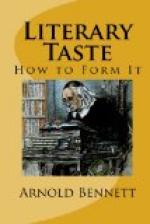This accomplished, you may begin to choose your poets. Going back to Hazlitt, you will see that he deals with, among others, Chaucer, Spenser, Shakespeare, Milton, Dryden, Pope, Chatterton, Burns, and the Lake School. You might select one of these, and read under his guidance. Said Wordsworth: “I was impressed by the conviction that there were four English poets whom I must have continually before me as examples—Chaucer, Shakespeare, Spenser, and Milton.” (A word to the wise!) Wordsworth makes a fifth to these four. Concurrently with the careful, enthusiastic study of one of the undisputed classics, modern verse should be read. (I beg you to accept the following statement: that if the study of classical poetry inspires you with a distaste for modern poetry, then there is something seriously wrong in the method of your development.) You may at this stage (and not before) commence an inquiry into questions of rhythm, verse-structure, and rhyme. There is, I believe, no good, concise, cheap handbook to English prosody; yet such a manual is greatly needed. The only one with which I am acquainted is Tom Hood the younger’s Rules of Rhyme: A Guide to English Versification. Again, the introduction to Walker’s Rhyming Dictionary gives a fairly clear elementary account of the subject. Ruskin also has written an excellent essay on verse-rhythms. With a manual in front of you, you can acquire in a couple of hours a knowledge of the formal principles in which the music of English verse is rooted. The business is trifling. But the business of appreciating the inmost spirit of the greatest verse is tremendous and lifelong. It is not something that can be “got up.”
CHAPTER X
BROAD COUNSELS
I have now set down what appear to me to be the necessary considerations, recommendations, exhortations, and dehortations in aid of this delicate and arduous enterprise of forming the literary taste. I have dealt with the theory of literature, with the psychology of the author, and—quite as important—with the psychology of the reader. I have tried to explain the author to the reader and the reader to himself. To go into further detail would be to exceed my original intention, with no hope of ever bringing the constantly-enlarging scheme to a logical conclusion. My aim is not to provide a map, but a compass—two very different instruments. In the way of general advice it remains for me only to put before you three counsels which apply more broadly than any I have yet offered to the business of reading.




